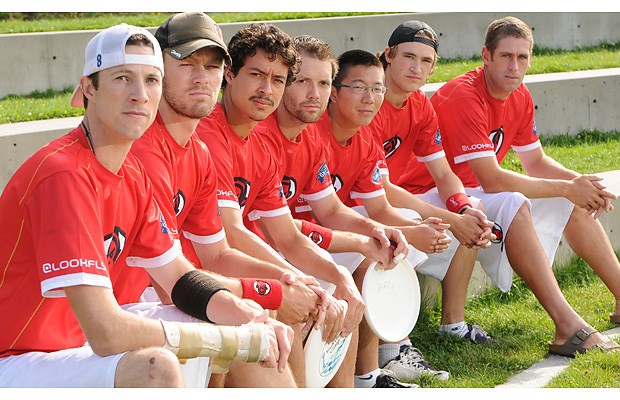To nurture their culture of success and rise to reign as one of the best ultimate teams on the planet, Furious George pursued a demonic work ethic, developed a jingoistic dislike for a cross-border opponent and turned to a younger generation to carry on the tradition.
The Vancouver ultimate team is the winningest in Canadian history. Since 1995, Furious George has dominated the Canadian Ultimate Championships, not only winning each national tournament in all of the eight years they chose to attend, but doing so without losing a single game along the way.
“There are no excuses to not win once you put that jersey on,” said Nick Menzies, one of the team’s five captains. “You must believe you can win. That’s something we’re very vocal about.”
Furious George, a name that riffs off the children’s books, couldn’t be more different than the curious, juvenile simian. Rather, the team embraces an “angry monkey” for both its emblem and psyche.
“There were some very competitive individuals on the team who would not take second as a result,” C.J. Harmer, the longest-standing player of a roster of 27, said of the team’s early days. “When we got successful in the States, it kind of allowed us to see that we could win. From then, it set the culture for he team.”
Although Furious George won back-to-back World Ultimate Championships, in 2004 and again in 2008 when they played with hometown advantage at UBC, the true test of the sport’s supremacy is held in the U.S. Fuelled by a deep collegiate culture with thousands of amateur competitors, U.S.A. Ultimate counts more competitive teams in most states than all of Canada, according to Menzies.
“To play at the level that we seek to play at—our goal is to be the best in the world—we play in the U.S. The quality is better and they’re close,” he said, pointing to the Canadian nationals which are often held east of Winnipeg. They were in Ottawa earlier this month.
Because Portland and Seattle are epicenters for the athletic Frisbee sport that self-regulates without the assistance of any referees, a Vancouver team can travel on the cheap across the border rather than fly across the continent. The rarity of rival teams outside of Vancouver (their main Canadian nemesis is Toronto’s GOAT) has little to do with the weather, he said.
“Boston has great teams. One of the most successful U.S. programs is in Madison, Wisconsin, and they can’t play outside until April.”
In July next year, Furious George travels to Japan to defend their two World titles. But the greatest feather in their cap, players say, is winning the coveted and highly competitive U.S. championships, which they have done three times in 2002, ‘03 and then ‘05.
“If we win, then the second-place team gets to represent the United States,” said Menzies.
The 2011 tournament is set for October but it may be one of the last for any non-U.S. team, he said.
“When a Canadian team wins the U.S. national tournament tour, some people think that’s a bit funny. Realistically, we’re going to get kicked out of that soon. The top team, they like having us around because they view the tournament as being the best tournament.”
One of those teams is Furious George’s most despised and venerated adversaries, the Seattle Sockeye. To advance at almost any competition outside of Canada, the Vancouver team usually faces this regional rival. In the U.S. finals, Furious George met Sockeye in the 2005 and won. The Canucks then lost the following year but defeated them again two years later on the world stage.
“We play them more times a year than any other team,” said the team’s co-captain Morgan Hibbert. “There is quite an unhealthy hate toward each.”
Hibbert, who graduated from Kits secondary in 1999, said Sockeye has won more overall matches and now holds at least a five-game winning streak, but adding fuel to an already intensely burning rivalry, he said, “We tend to win the big ones.”
Hibbert was introduced to the sport in Grade 11 when a new teacher started a team at the West Side high school. Later as a player at UBC, he was drawn to Furious George, which counts athletes with history in minor hockey, metro soccer and even the national fencing team.
As an ultimate program, Furious George actively develops younger talent. Menzies coaches the team at Point Grey secondary, his alma matter, and other players are involved at Kits and at UBC. Jon Hayduk coaches the junior team, Shock, which won nationals in their age group, making him a two-time Canadian champion this year.
Practices—three a week plus disciplined individual fitness and strength training—earn a reputation for being physically and mentally difficult, punishing even. The captains work to maintain so such intensity, some players opt out.
“We hold our players to high standards and for some people, it’s too intense,” said Menzies. “In practice or a game, if somebody makes an error, often they’ll be yelled at. Some people don’t like that. Different players when you yell at them, you will get a positive response but with others, you’ll get a negative response. We’ve had to use that carefully but there is a performance accountability.”
Said Hibbert of the founding members who instilled the competitive culture: “That mentality was present at every singe practice, every single training session. Even just when competing against each other, these were teammates and someone had to lose. And they hated that.”
This is the drive to win, he said.
The reign of Furious George isn’t merely about on-field ferocity. Team camaraderie, loyalty, long-distance travel and pride come with being one of the best ultimate teams in the world.
Plus, they may be a little unhinged, concedes co-captain Hibbert: “They hated losing more than they enjoyed winning.”
Which may explain why they win at rarely losing.
[email protected]
Twitter: @MHStewart



